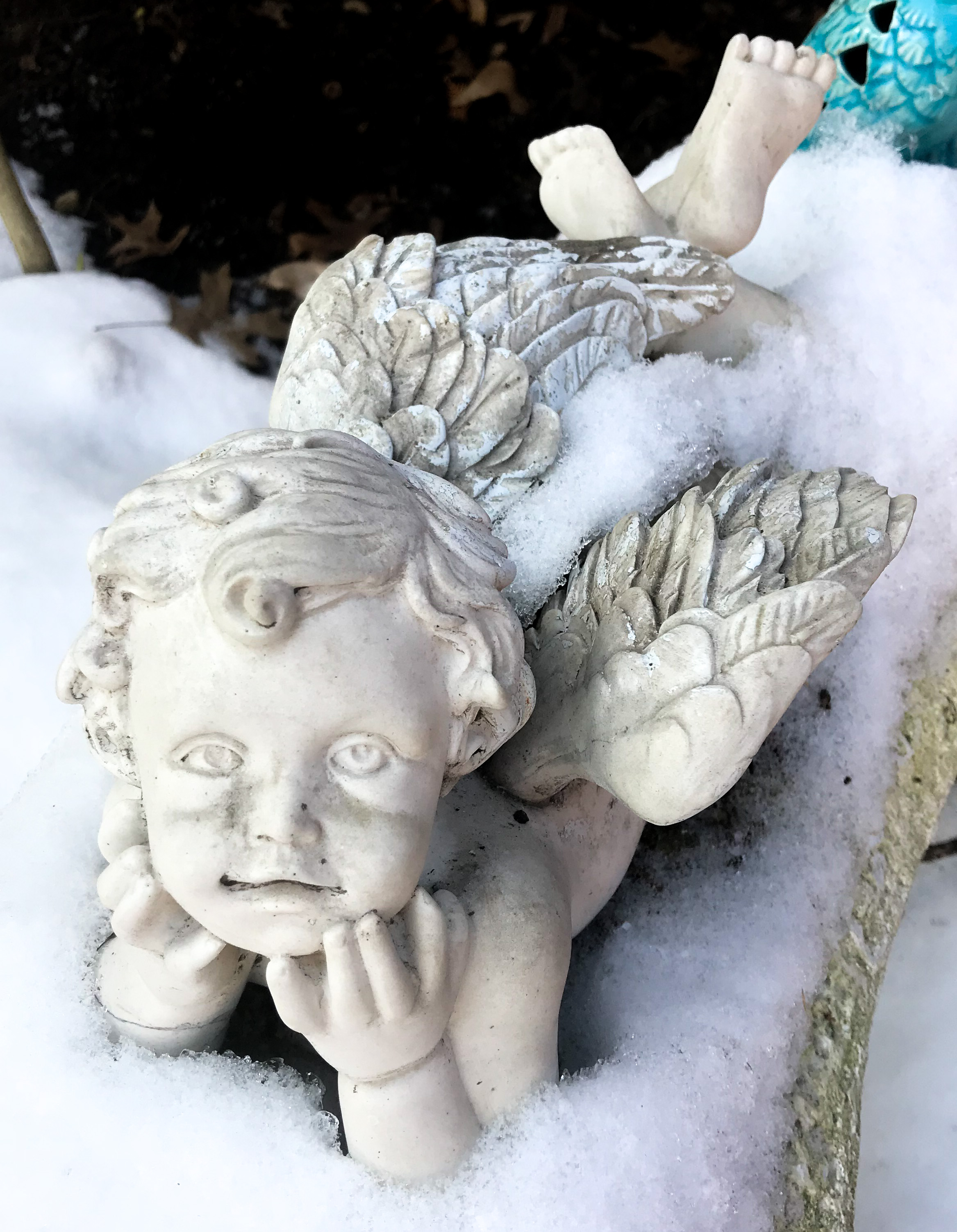
Yesterday was a mish-mash of relaxed urgency for a Sunday, reading the paper and then running to Costco to remedy a billing debacle, and the excited hurry-up-and-wait drama of the return of Games of Thrones. By 9:00, I was ready to retreat to my cave and just watch all the reunion-y goodness and the requisite badness of GOT. Personally, I think it was worth the wait.
In keeping with the GOT winter theme in my little cave, it’s snowing here in Ohio this morning. After several days of temps in the 60s and 70s, the budding tulips and fragile spring flowers are getting one more soft white blanket. One can only hope that it won’t last long and is not a harbinger of still more winter to come–or the coming of the Knight’s King (according to GRRM) which would not surprise me in the least.
On to other things: Chapter 3 in the saga of George Fairweather. I hope you’ll let me know what you think.
Chapter 3
George was happy to discover that William would be spending the entire summer with her great-aunt Harriett over on Wilbersham Terrace, just a hop, skip, and a jump from George’s own front porch. It took no time at all for the girls to work out a routine of reading, laughing, and playing during their long warm days of summer. George’s mother soon grew accustomed to leaving a muffin and a cup of milk on the counter by the back door rather than scolding George for not eating a proper breakfast.
“No time!’ George would shout as she scooted out the back door. She would, however, take a moment to drink the milk and grab the muffin, more often than not stuffing it into her pocket to share with William which was better than nothing, her mother figured. She often didn’t see her daughter again until just before dark when George would come running through the back door, skidding across the linoleum to beat her curfew.
“The light on Maple just blinked on!” she’d announce breathless, having run all the way from William’s.
“Wash your hands…” Rita began,
“…and your face and tidy up,” George finished for her. “I know, I know. I’m a mess.”
Wash up finished, George would sit with her mother for an early supper, usually a light meal of tuna sandwiches or a casserole and peas.
“Anything interesting happening in the village?” her mother would always inquire.
“Not really,” was the standard answer, although George could be counted on to dish the details if anything at all was going on.
“Did you hear about Mrs. Crawford’s tumble down the stairs?” George asked. “She had a doctor’s appointment and was supposed to meet her sister Ruth at the curb for a ride. When she didn’t come out, Ruth went in and found poor Mrs. Crawford all in a jumble at the foot of the stairs, knocked out cold—or so she said.”
“Who said?” her mother asked, daintily picking at her food.
“Mrs. Crawford’s sister Ruth.” George stopped eating her sandwich and looked directly at her mother. “I’ve heard her yell at Mrs. Crawford in the grocery, telling her to hurry up, nudging her sharply. I wouldn’t be surprised if she batted her sister over the head and knocked her out just to make the story more interesting. I’ll bet Mrs. Crawford had simply fallen and was probably calling for help.”
Rita sighed loudly. “Now, sweetheart, there’s no need to elaborate on the facts. A tumble down the stairs at Mrs. Crawford’s age could very well have knocked her unconscious. I doubt very much if her sister would do something as mean as hitting her sister after such an event. Where do you get such outlandish ideas?”
George gazed off into the distance, thinking. “I don’t know,” she replied. “Maybe too much television.”
“Then I suppose we should put a limit on how much you watch. Or maybe just stick to uplifting programs.”
Rita doubted television made much of an impact on her daughter. As a family they rarely watched TV, all three, mother, father, and daughter, preferring books to television, especially her daughter who since she’d learned to read at the age of three, was determined to read into the wee hours of the morning. Turning out the bedroom light and going to sleep had long since been a battle Rita had rarely won. Her daughter preferred to go to school happily sleepy rather than go to sleep not knowing how a story ended. Rita understood and only very rarely enforced the midnight lights out rule. She herself could stay up reading until dawn and with only an occasional yawn or two, make it all the way through the day and into evening. Reading through to the end of a book was a happy thrill only superseded by the thrill of beginning a new one. So, Rita and her daughter were constantly in a state of happy satisfaction or even happier anticipation.
Unless, of course, the book they were reading was a real stinker which happened now and again. When that was the case, there was no happiness to be found in the Wilson household for everyone knew it from the grumbles and sighs and angry exhortations that bounced through the house at all hours.
“You really must enforce the lights out rule,” Howard often said to Rita. “I don’t know that I can stand night after night of this.” This being the groans and shouts coming from their daughter’s room. Rita empathized with her husband but unerringly knew that once the book was finished—and most likely buried in the back yard or burned in the trash heap—her daughter would find another to take its place and all would be right with the world again. Perhaps. Hopefully.
Summertime was a wonderful spate of solace in the Wilson household as Howard worked long hours, coming home long after dark, and Rita spent most of her day lounging in the back yard, contemplating weeding the flowers and/or planting a vegetable garden. Yard work was always on her to do list but somehow never managed to bubble to the top, languishing idly at the bottom waiting for Rita to feel inspired which she almost never did. She’d bought a houseplant once and set it on the front porch to catch the light and a little air. The spindly carcass of the plant was ultimately tossed out with the rubbish, pot and all, as Rita had forgotten about it once she’d set it outside. Forgetfulness seemed to be a Wilson family trait, although they were all meticulously punctual about returning library books. They might forget to eat or buy tea or turn the wash into the dryer, but they always always always returned their library books on time if not before they were due.
Mrs. Paschal, the head librarian at the main library, believed it was so they could call in library favors such as being the first on the list when an anxiously awaited book was due from the publishers. Or an extra five minutes to select a book right at closing time when everyone had been shooed out and poor Mrs. Paschal stood waiting to lock the doors. She always obliged mostly because the Wilsons were such nice friendly people but always with a mind to the knowledge that they had never in all the years she’d known them returned a book after its due date. Nor would they ever. “It would have to be a matter of life and death, I do believe,” Mrs Paschal said to Merry Beecham one afternoon when the Wilson child came scurrying in just before closing time to return a stack of books as tall as she.
“My mother’s, mine, and the one on the bottom is my father’s,” the child said brightly. “I’ll be quick,” she’d said as she lit off to the young adult section to make her selection. Merry Beecham had to agree. “I’m quite sure nothing could keep them away.”
Now here she stood, that same child now a grown woman, at the counter of the genealogical wing of the Windham Library in Sussex County asking for assistance in locating George Fairweather.
“I’ve traced the name to here,” George explained, “to the county seat. It seems Mr. Fairweather was a man of some prominence—or perhaps it was his family. I’m not sure. I only know that the records have led me here to Sussex County and I was wondering…”
“If we have any information, a book, microfiche perhaps, that will help you in your search.” The librarian on the other side of the counter gave George a whimsical look and then smiled. “That’s what we do here, Miss. Genealogy. We help people find their ancestors.”
George smiled shyly, her face turning pink. “Well, of course. That’s why I’m here,” she admitted.
“Now, what was the family name? Fairweather you said?” The librarian’s face seemed open and kind but her eyes were lasers of intensity. George felt exposed somehow, under the woman’s gaze.
“Yes, George Fairweather.”
“Let me check,” the librarian said turning away, her fingers fairly flying over the keyboard in front of her. “Well, it seems you’re in luck,” she announced almost instantly. “There are quite a few references for the name Fairweather as well as several for George Fairweather in particular. Give me just a moment and I’ll print them for you.”
Walking to the printer on the desk behind the counter, the librarian explained the information she was about to give George. “Each entry will have a reference number with title, page, and date published. Several of our volumes are under lock and key so it will be necessary for you to fill out a form requesting that the volumes be pulled for you to review. I can take care of that for you with a little more information.”
The librarian handed George the paper she’d torn from the printer which was quite a bit longer than George had expected.
“Looks like you have your work cut out for you,” the young woman said with a grin. “The volumes marked with an asterisk are in the private collection. I’ll give you a minute to peruse the list and then let me know if you’d like to make an appointment to review them.”
George stood with the list in hand, immediately struck by the smallness of the print and the number of entries cascading down the page. It might take weeks to get through each and every reference. Perhaps she had not allotted enough time for her research after all.
“You may find a seat in the alcove if you’d like,” the librarian suggested. “There are tables and chairs and a desk or two if you’d prefer.”
George stepped in that direction, just to the right of the reference counter and into the path of a dark haired young woman standing behind her waiting in line.
“I’m sorry,” George said as she relinquished her spot in front of the counter. Turning back to the librarian George offered a quick thank you.
“No problem,” the librarian said, focusing her intense gaze on her next customer.
George stepped up to the counter once more, laying out the printout with the references for the librarian to see.
“I’ve highlighted the volumes I’d like to review,” she said. “I’m not sure they’re all necessary but I want to at least look through them while I’m here.”
The librarian looked at the clock behind her. “We’ll be closing in twenty minutes. If you’d like to leave the list, perhaps I could pull the volumes and have them ready for you tomorrow. I can reserve a carol in your name or a private study if you’d like.”
George glanced at her own watch. “I thought the library closed at seven.”
“Except on Wednesdays,” the librarian said. “We close at four on Wednesdays.”
“Then I’d like to leave the list if you don’t mind. Or perhaps make a copy?”
The librarian picked up George’s list and walked to the copier that boasted a sign reading, “10 cents per copy.” George dug in her pocket for a dime but was waved away when the librarian returned. “This is for me,” the librarian said handing back George’s list. “No charge for you.”
George smiled. “Thanks. What time do you open tomorrow?”
“Nine on Thursdays. I get in about eight so I’ll pull the volumes you’ve selected and look around for anything else I think might be of help to you.”
“That’s very kind of you,” George said.
“No problem,” the librarian smiled. “Now, let me get your name so I can reserve a private study.”
George hesitated, suddenly—and for the first time—felt flustered about giving her name. “George,” she said tentatively. “George Fairweather.”
The librarian looked up sharply in surprise. “Really?”
“Really,” George replied.
“George F.,” the librarian wrote on her schedule, marking an “x” on study 301 on a seating chart. “I’ll see you tomorrow, George.”
“Yes, and thank you,” George said. “I’ll see you tomorrow.”
George turned to walk away but decided to ask one last question. “May I have your name?” she asked, “so I know who to ask for in the morning.”
“I’ll be the only one here in the morning,” the librarian demurred.
George nodded and turned away.
“But I’ll tell you my name anyway,” the librarian continued. “My name is Michael. Michael Everest.”
George smiled and kept on walking jauntily all the way back to the inn.
(to be continued)















